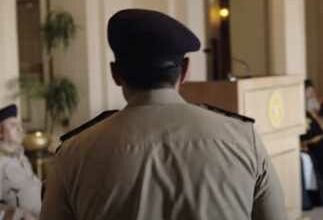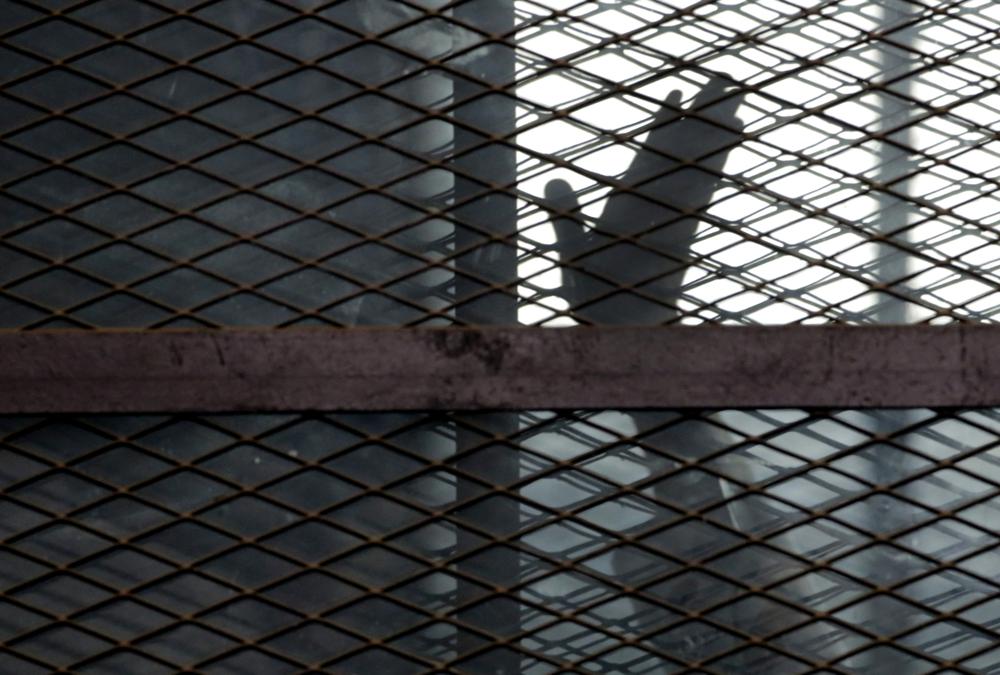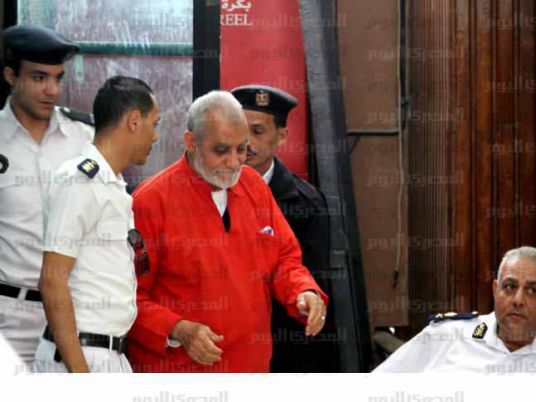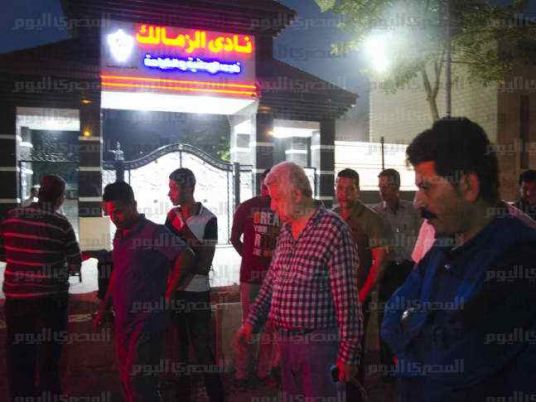News that Salafi presidential candidate Hazem Salah Abu Ismail won the court case he raised against the Ministry of Interior to release documents proving that his mother has no passport other than an Egyptian one dominated news headlines on Thursday.
Allegations of the dual citizenship of Abu Ismail’s mother, who apparently also held an American passport, have threatened the Salafi preacher’s chances of running for president. Election rules state that at the very least the candidate’s immediate parents must be full-blooded Egyptians and not hold dual citizenship.
“The return of Abu Ismail to the presidential race,” reads the headline of state-owned Al-Ahram’s front page with a picture of Abu Ismail supporters holding the signature blue posters of the candidate’s smiling face and bushy white beard. Al-Shorouk’s headline reads “Ruling ‘under siege’ … no evidence for Abu Ismail’s mother’s foreign nationality,” with a photo of the fireworks thousands of his supporters lit last night in celebration.
An estimated 4,000 people marched from the State Council, which issued the court verdict, through Tahrir Square and at Maspero chanting “Speak, don’t be afraid, Abu Ismail doesn’t lie” and “come to Jihad if there is corruption.”
Tahrir newspaper reads “The judiciary is victorious for Abu Ismail over the Interior [Ministry],” while Al-Gomhurriya’s top headline boldly states: “Abu Ismail’s mother … 100% Egyptian.”
The surprise in Wednesday’s court case was the revelation that the Interior Ministry had provided no documents proving that Nawal Nour, Abu Ismail’s mother, held an American passport except for documents that show she used an American passport to leave and re-enter Egypt three times in 2008 and 2009. The surprise continues that these documents are unreadable photocopies with no official stamps, according to the independent daily Al-Shorouk. The Interior must, therefore, provide more convincing evidence.
The Muslim Brotherhood’s Freedom and Justice Party newspaper focused its front-page coverage to the million-man Friday march it is calling for tomorrow, pushing the Abu Ismail story to page 7. “Surprises from Abu Ismail’s case come in,” it reads.
“The People return to Tahrir,” the Freedom and Justice's main headline reads. The Muslim Brotherhood is calling for this march to “protect the revolution,” it says, and to demonstrate against former the candidacies of vice president Omar Suleiman and any other member of the former regime.
“Suleiman’s black boxes don’t scare us,” the newspaper’s sub-headings states, which is a quote from recent on-air statements made by the Muslim Brotherhood’s presidential hopeful, Khairat al-Shater, responding to an on-air statement by Suleiman during a phone-in with talk show host Amr Adib, in which he made a seemingly threatening reference to “black boxes.”
The FJP party paper reports on the decision by the International Union of Muslim Scholars to use Friday sermons to warn people against voting for members of the former regime, especially Suleiman, and raising awareness about this issue.
Shater is also in the news for a court case relating to his candidacy. “The court for excluding Shater steps down,” reads Al-Ahram. The “Shater court steps down sensing embarrassment,” the FJP’s news story states, while Al-Shorouk elaborates further: “Ayman Nour forces the court to step down in the Shater case.”
The presidential hopeful has been the subject of a court case brought forth by leftist presidential candidate Abul Ezz al-Hariry arguing that Shater should be excluded from the race, and that his pardon by the Supreme Council of the Armed Forces should be cancelled. Nour had also been pardoned by the SCAF to allow him to run for president, but this decision was reversed.
Shater was given a pardon for the prison sentence during the former regime, on charges of illegally funding the Muslim Brotherhood, a banned group till the revolution, and for alleged money laundering. The withdrawal of Nour’s pardon and not Shater’s is the “embarrassment” the judges in the case are sensing.
The decision to re-assemble the Constituent Assembly, which will write the new constitution, also made front-page news. “Solving the constituent assembly is a rehearsal for solving the Brotherhood” the main headline of Al-Wafd’s eponymous party paper main headline reads, in reference to the dominance of Islamists in the constituent assembly, which was the reason for the court decision to re-assemble its make-up. “The illegitimate assembly forces the Brotherhood to search for consensus,” Al-Shorouk’s headline on the story states.
Other main news stories include the People’s Assembly’s discussion that will take place Thursday on a law approved by the Legislative Committee to prevent former regime members who were part of the now-dissolved National Democratic Party over the last ten years from running for office. This would apply to presidential candidates Suleiman and former prime minister Ahmed Shafiq.
Presidential candidate Mortada Mansour has been summoned to court in the Battle of the Camel case. He is the tenth person to be accused in the case, and has been absent in the last three court hearings, according to the privately-owned paper Al-Tahrir. His son, Ahmed Mortada, and nephew, Wahid Salah, are also being summoned. They are accused of being involved in the day when men on horse-back and camels charged into Tahrir Square, killing many demonstrators.
And finally, you cannot escape noticing the man on the crucifix who hung on a pole in Tahrir Square yesterday to the surprise of many onlookers. “The Egyptian is crucified anew,” Al-Tahrir’s headline reads. “The marvels of Tahrir Square,” Al-Akhbar reads, with a close-up picture of the man who chained himself to a wooden crucifix on a metal pole. Sayed Al-Sawy crucified himself in protest at the Interior Ministry for following him around for years inside and outside Egypt for poems he wrote against the former regime, he says.
The image of the crucifix reminds us that it is a holy week for the Coptic and Christian community, which will celebrate Easter this weekend.
Egypt’s papers:
Al-Ahram: Daily, state-run, largest distribution in Egypt
Al-Akhbar: Daily, state-run, second to Al-Ahram in institutional size
Al-Gomhurriya: Daily, state-run
Rose al-Youssef: Daily, state-run
Al-Dostour: Daily, privately owned
Al-Shorouk: Daily, privately owned
Al-Wafd: Daily, published by the liberal Wafd Party
Youm7: Daily, privately owned
Al-Tahrir: Daily, privately owned
Freedom and Justice: Daily, published by the Muslim Brotherhood's Freedom and Justice Party
Sawt al-Umma: Weekly, privately owned
Al-Arabi: Weekly, published by the Nasserist Party
Al-Nour: Official paper of the Salafi Nour Party




